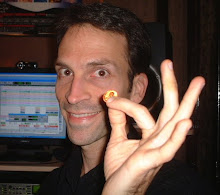Q: What do losing weight, mastering a musical instrument, and saving money have in common?
A: The decision to do it is easy, but it's hard to get started, and even harder to maintain.
Actually, saving money may be the easiest of these three goals, because it really requires very little time and exertion once you get started. The key is consistency. A little bit of money saved every month will move you toward financial independence more surely than relying on occasional financial windfalls, in the same way that practicing for an hour a day will lead to more musical progress than practicing intensively just on weekends.
How can you save money consistently when everything else in your life takes priority? You can't. That's why you have to treat your monthly savings amount as a bill which must be paid (to yourself). In fact, you should think of it as your most important bill, to be paid first before all other obligations. Pretend that there is a scary loan shark or mobster invoicing you for it each month......better not disappoint him!
Even if you're only putting aside $50 per month, you should pay yourself first. Your rent, utilities, and other bills get paid because you have to pay them, right? Treat your savings the same way. And remember, as I mentioned in an earlier post, we are talking about long-term savings here, so it's important to send the money off to a separate, "do not touch" account each month.
Many mutual funds and other investment vehicles offer automatic investment plans, in which you designate a fixed amount to be automatically deducted from your checking account and invested each month. That is the ultimate in pay yourself first investing, because you can't even use the excuse that you ran out of checks or missed a monthly contribution because you were too busy. This strategy also enables you to use dollar cost averaging (subject of a future post) to reduce market timing risk.
Give some thought to what your long term savings goals are and how much you could realistically manage to "bill" yourself for monthly. Once you start this kind of plan, you will need to take it seriously and commit to it.
By the way, the same principle could also be applied to getting out of debt faster. For example, you could decide that your self-imposed "minimum payment" for every credit card bill will from now on be 20% greater than the actual minimum payment stated on the bill.
Subscribe to:
Post Comments (Atom)






No comments:
Post a Comment